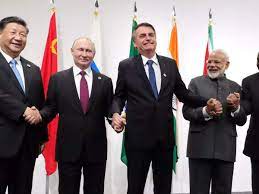Ahead of the BRICS summit in South Africa next month, an interesting piece of news surfaced about BRICS currency not being on the agenda of the meeting. “There’s never been talk of a BRICS currency, it’s not on the agenda,” Anil Sooklal, South Africa’s Ambassador at Large: Asia and BRICS told the media. “What we have said and we continue to deepen is trading in local currencies and settlement in local currencies,” he added.
This assumes significance when seen in the context of the Russian media broadcasting to the world that according to Russian government officials, a decision had been taken by BRICS to dump the dollar and trade with a separate currency. Since most of these assertions came when Prime Minister Narendra Modi was in the United States on a state visit, these created a flutter in media circles internationally, trying to paint India as an unreliable partner, working against the US dollar. Later, it took Minister for External Affairs, S. Jaishankar to assert that the BRICS did not have any plans for a common currency and that currency would stay national for a long time to come. Given these circumstances, it is but natural to think that the Russians had the ulterior motive of derailing PM Modi’s US state visit, with the intention to throw a spanner in India-US relations.
Hence, this tall tale about a BRICS currency seems to be among many of the ongoing efforts to keep India away from the US. India-US relations are among the most consequential in the world, but there are too many interests arrayed against India, trying to ensure that these two countries are unable to fulfil the potential of their partnership. In fact, soon after the PM’s visit to the US, one of the US mainstream newspapers published a similar piece on why the Indian leadership could not be trusted to be a US partner. Then a British financial magazine wrote a piece on there being news about India and China mending relations. Coming at a time when India rejected, because of security concerns, Chinese company BYD’s US$1 billion investment plan to build electric cars and batteries here in partnership with an Indian company, the propaganda is reaching amusing levels, especially since it is the western countries, including the US that are literally fawning over China. In such a situation, India seems to be the only country standing up to China, almost on all international platforms—be it the SCO or the BRICS. However, if there is no BRICS currency eventually, it will be likely because of China, which is working towards a situation where the yuan ultimately replaces the dollar as the most widely used currency in international transactions. So, a common BRICS currency does not suit even China, unless it is backed by the Chinese renminbi. In fact, this sudden surge among over 40 countries to join BRICS, with 22 submitting a formal application, could give an upper hand to China in converting this multilateral forum into a unipolar one, if the majority of countries belong to the Chinese sphere of influence. One of the reasons that India has been resisting expanding BRICS into BRICS Plus—a Chinese idea mooted in 2017—is because an expanded body will strengthen China’s influence in this multilateral organisation, while diluting the influence of countries such as India and Brazil. Even South Africa’s entry into the BRICS in 2010 was facilitated by China, with the objective being to make the IBSA grouping (India, Brazil and South Africa) irrelevant, say analysts—which is what happened. IBSA now more or less exists in the history books. Hence, China’s whole attempt is aimed at undercutting any influence that any of the bigger countries—with India being the foremost—may have in any international fora.
Meanwhile, Russia is aiming to convert BRICS into an anti-Western bloc and paint India in the same colours. It’s a no brainer that it would have the backing of China towards this purpose.
Chances are that the BRICS too is headed to become a China-dominated body, because once the flood gates are opened there is no stopping the process. But that does not mean that India should sit quietly. In fact it is India that is a rare bulwark against a rampaging China. And one of the ways of ensuring that BRICS too does not fall in China’s lap is for India to ensure that yuan is never adopted as the BRICS common currency. Given China’s hold on Russia, sooner or later the latter will start pushing yuan as the BRICS currency, a process that may come to be facilitated by many of the China acolytes that are expected to make an entry into a potential “BRICS Plus”. China is focused about the yuan displacing the dollar as the main currency internationally and the BRICS could be a stepping stone towards that process. India needs to be vigilant, while also ensuring that its own currency, the rupee, gets its fair share of trade opportunities with countries that are made a part of an expanded BRICS.

















